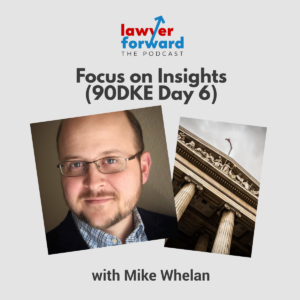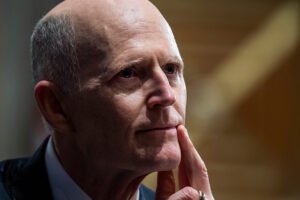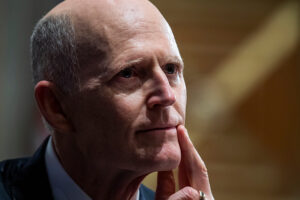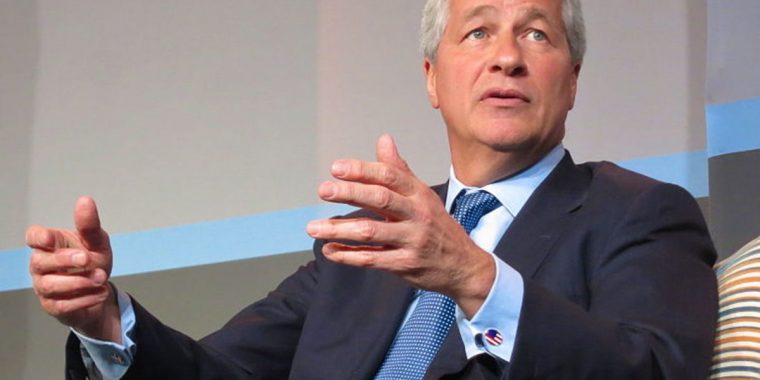U.S. Department of Justice (photo by David Lat).
Every day it’s something new. The latest is that the Justice Department has come out with its official proposal to revise Section 230. As you may recall, back in February, the DOJ held some hearings about Section 230, followed by announcing some vague and contradictory guidelines for reform in early March.
Apparently between March and now there’s been nothing more important for the Justice Department to be working on, because it’s now blasted out its full unconstitutional proposal for reforming Section 230 and it’s like a greatest hits of bad ideas. You can look at the redline version of the law itself, but the DOJ’s announcement summarizes the revisions in two giant buckets: (1) “promoting transparency and open discourse” and (2) “addressing illicit activity online.” It will not surprise you that the actual recommendations would do neither of these things. There’s a lot in here and I’m honestly just too tired of going through and debunking all the various bad ideas in these proposals, so I’ll just highlight a few egregious parts.
First off, like the recent “Online Freedom and Viewpoint Diversity Act” and the soon to be marked up “Online Content Policy Modernization Act” from Senator Lindsey Graham, the DOJ’s bill would remove the term “otherwise objectionable” (get your t-shirts while they’re still relevant!), and simply create a longer list of why a website could moderate content. It would also require an “objectively reasonable belief” that the content falls into one of those categories to qualify. The new list of acceptable reasons to moderate content to keep your immunity:
any action voluntarily taken in good faith to restrict access to or availability of material that the provider or user has an objectively reasonable belief is obscene, lewd, lascivious, filthy, excessively violent, promoting terrorism or violent extremism, harassing, promoting self-harm, or unlawful, whether or not such material is constitutionally protected
This is pretty similar to the two bills listed above. The only real difference is that this one adds in the promotion of “violent extremism” which you already know that this DOJ will use to include trying to force social media companies to take down Antifa and BLM content.
But, of course, as we discussed with the previous bills, this is clearly unconstitutional. It is a form of regulation of content that is not content neutral, and that’s not allowed. Also, note what kind of content is not included here: racist, homophobic, hateful content would not be covered in many cases. Nor would spam. Yes, in some cases it could be argued that such content is “harassing” or perhaps it might qualify for some of the other categories, but most of it would lead a site to not have 230 protections. Websites would still have 1st Amendment protections, but to fight that legal battle would be hugely expensive and destructive for most websites — meaning that many will not fight at all.
The bill would also expand 230’s exemptions such that federal civil actions were no longer exempt (as per the FTC’s wish). It also includes a bunch of other carve-outs that I’m too tired to go through, but will note that it would appear to allow state Attorneys General to bring lawsuits against websites that were previously barred by 230. This would be allowed in cases where the sites had knowledge of the dissemination of content that would violate Federal criminal law, that the site was notified of this content, and then failed to remove it or failed to preserve evidence of it.
This section is at least worded slightly more carefully that earlier proposals, but would still lead to the risk of significant censorship at the behest of Attorneys General who criticize a website’s content moderation practices — which again would likely make it unconstitutional under the 1st Amendment.
It would then throw in a long list of new laws that were exempt from 230, basically taking the FOSTA model of saying that 230 no longer applied to sex trafficking, and saying “ditto for anti-terrorism laws, child sex abuse laws, cyberstalking, and antitrust.” There are, of course, significant problems with each of these. We’re already seeing how much harm FOSTA has caused with no indication that it helped stop any sex trafficking, and now the DOJ wants to just expand that treatment to a bunch of other laws, just because.
The anti-terrorism one should be particularly concerning. We’ve wrote about a whole bunch of cases involving people who sued social media for “material support for terrorism” in response to a loved one being killed by terrorists. The arguments are, roughly, that because their family member was killed by a terrorist, and because some terrorist-connected individuals used social media, clearly, the social media companies are liable for their family member’s death.
Courts have, rightly, been tossing these cases out on 230 grounds. But if the DOJ got its way, that would no longer be possible, and we’d likely see a ton of frivolous litigation in response.
Another change is an attempt to remove 230 protections for sites that fact check the President. This is not how it’s framed of course, but it’s pretty obvious why Bill Barr wanted this in there. Existing 230 says that you can be liable for content if you were “responsible, in whole or in part, for the creation or development” of the information. The new bill would add to that:
Being responsible in whole or in part for the creation or development of information includes, but is not limited to, instances in which a person or entity solicits, comments upon, funds, or affirmatively and substantively contributes to, modifies, or alters information provided by another person or entity.
Basically, fact check someone, and you can lose your 230 protections. Of course, again, this is unconstitutional, as it’s an attempt to suppress the very thing that 230 (and the 1st Amendment) were designed to encourage: more open discussion. Indeed, for Bill Barr — who has whined about “cancel culture” — to include this in there is deeply ironic. This kind of thing will decrease incentives to add commentary or fact checks, thus suppressing speech.
Finally, the new bill would have a whole section to define what is meant by “good faith” in content moderation, which is basically that you have to clearly delineate in your policies what is allowed and what is not, and your moderation must match that. This is, of course, impossible. It is written by people who have never had to moderate content at all. It is written by people who don’t understand how content moderation is not black and white, but often vast areas of gray where judgment calls need to be made. It is written by people, in bad faith, assuming that all users of a website are acting in good faith. So many of these attempts to reform Section 230 refuse to take into account that people will seek to game the system. And restricting sites’ ability to stop those gaming the system is a recipe for disaster.
But, hey, this is Bill Barr’s DOJ and Donald Trump’s White House. A policy proposal that is a recipe for disaster, as well as unconstitutional, seems to be par for the course.
Justice Department Releases Its Dangerous & Unconstitutional Plan To Revise Section 230
More Law-Related Stories From Techdirt:
Woof: Jack Daniels Takes Fight Over Doggy Chew Toy To The Supreme Court
If Patents Are So Important To Innovation, Why Do Innovative Companies Keep Opening Up Their Patents Rather Than Enforcing Them?
FCC Keeps Using Bogus Data To Claim It’s Closing The ‘Digital Divide’






 Olga V. Mack is the CEO of
Olga V. Mack is the CEO of 













